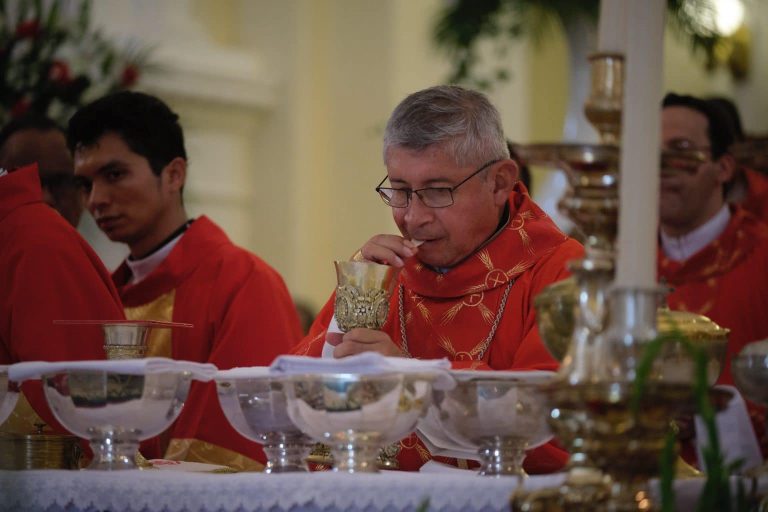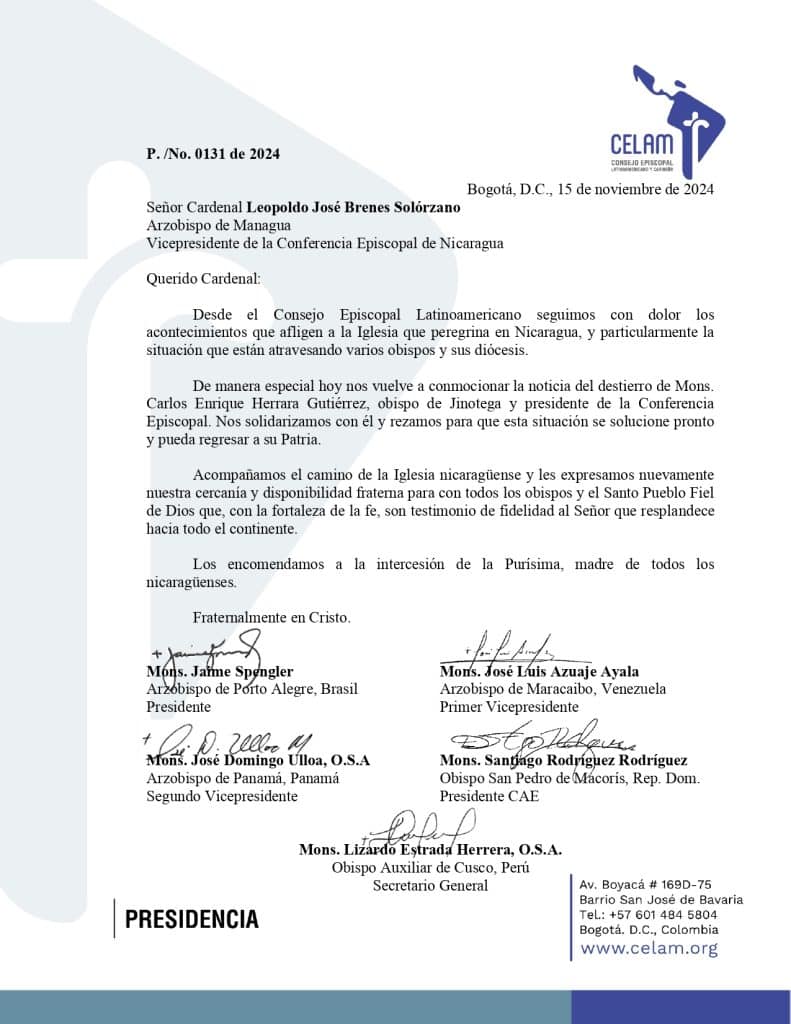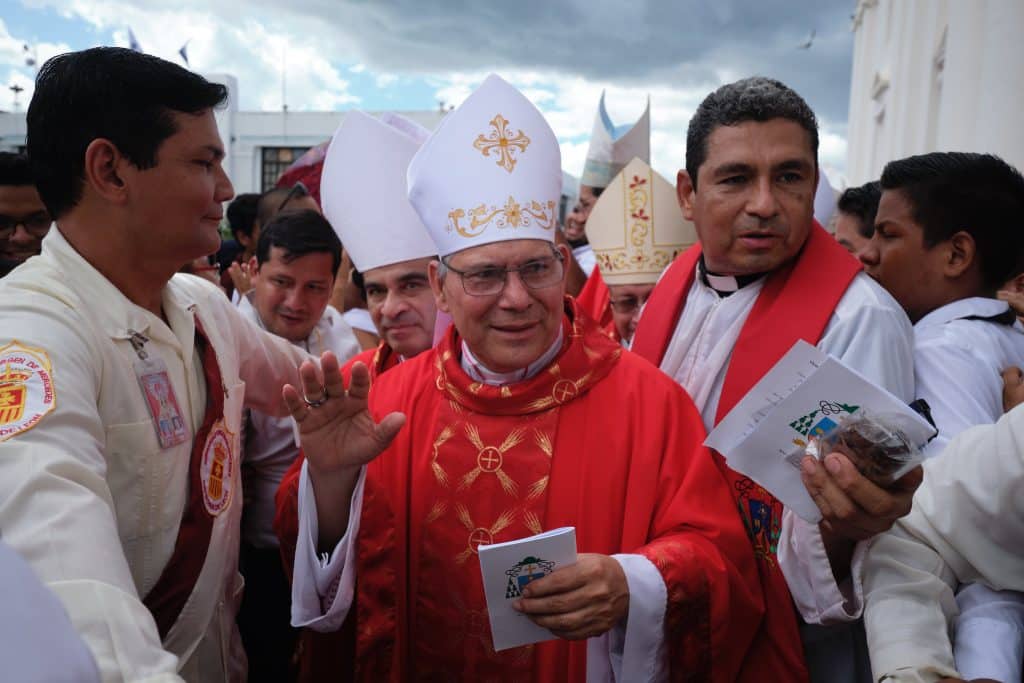19 de noviembre 2024

Children of Exile: The Births “Sowing Hope” in the Camp of Nicaraguan Farmers

PUBLICIDAD 1M
PUBLICIDAD 4D
PUBLICIDAD 5D
“The expulsion and banishment of Bishop Herrera is a criminal act against religious freedom,” according to a human rights organization

The expulsion and banishment of Carlos Enrique Herrera, the bishop of the diocese of Jinotega and president of the Episcopal Conference of Nicaragua, is being described as “an act of repression that not only affects a religious leader, but symbolizes the growing and unstoppable persecution and repression faced by the Catholic Church in our country.”
The expulsion of Bishop Herrera joins those of Bishops Rolando Alvarez of the diocese of Matagalpa (north), and Isidoro Mora of the diocese of Siuna (Caribbean), “who were also banished and stripped of their nationality this year,” reported the “Nicaragua Nunca Más” Human Rights Collective, composed mostly of exiled Nicaraguan activists now based in San José, Costa Rica.
The Collective also recalled that in 2019, the auxiliary bishop of Managua, Silvio Báez, “had to go into exile after receiving death threats.”
“The banishment of Bishop Herrera is a criminal act against the religious freedom that every Nicaraguan has the inalienable right to enjoy. By persecuting Church leaders, it seeks to dismantle a fundamental pillar of society and undermine the community's ability to express itself freely,” declared the Collective.
The organization argued that exile or forced relocation—due to the systematic nature with which it has been carried out in Nicaragua—should be considered a crime against humanity. It is “an act that must be denounced and condemned by the international community.”
“We demand full respect for religious freedom and we call on all human rights organizations, the international community, and all Nicaraguans to stand in solidarity with the Church, the Catholic people of Nicaragua and all the victims of banishment, dispossession of nationality, and so many crimes that remain in impunity,” the Collective added.
Herrera, the 75-year-old president of the Nicaraguan Episcopal Conference, was expelled from his country and sent to Guatemala after celebrating a mass in which he denounced what he called the sacrilege of the Sandinista mayor of the municipality of Jinotega, Leónidas Centeno, according to exiled Nicaraguan priest Erick Díaz and exiled researcher Martha Patricia Molina, author of the study “Nicaragua: A persecuted Church?”
“Bishop Herrera's expulsion occurred days after he described as sacrilegious the fact that the dictatorship, through Mayor Leónidas Centeno, placed loudspeakers with loud music in front of the San Juan Bautista Cathedral during the Eucharist on November 10,” the Collective noted.
“Usually, the dictatorship's repressive forces put loud music near the churches to boycott the masses. After that the dictatorship closed the Facebook page of the Diocese of Jinotega,” the Collective said.
The Latin American and Caribbean Episcopal Council (CELAM) expressed its deep concern for the situation of the Catholic Church in Nicaragua, especially after the banishment of Bishop Enrique Herrera.
“The Latin American Episcopal Council is following with sorrow the events that afflict the Church in its pilgrimage in Nicaragua, and particularly the situation that several bishops and their dioceses are going through,” the bishops wrote.
The Council also reaffirmed its accompaniment of the Nicaraguan Church amid the country's political and social crisis.

The letter is signed by the Archbishop of Porto Alegre (Brazil) and president of CELAM, Jaime Spengler; the Archbishop of Maracaibo (Venezuela), José Luis Azuaje Ayala; the Archbishop of Panama, José Domingo Ulloa; the Bishop of San Pedro de Macorís, in the Dominican Republic, Santiago Rodríguez Rodríguez; and the Auxiliary Bishop of Cusco, Peru, Lizardo Estrada Herrera.
The Mexican Episcopal Conference (CEM) also expressed its deep concern and sorrow for the situation of the Catholic Church in Nicaragua, particularly the situation of several bishops and their dioceses.
In an official statement, CEM expressed its solidarity with Monsignor Carlos Enrique Herrera, bishop of Jinotega and president of the Episcopal Conference of Nicaragua, who had been banished from his country.
“As brothers in faith, we stand in solidarity with him and raise our prayers so that this difficult situation finds a prompt solution and he can return to his homeland,” said the statement, signed by Bishop Ramón Castro, bishop of Cuernavaca and President of the Mexican Episcopal Conference, and Bishop Héctor Mario Pérez, Auxiliary Bishop of Mexico and Secretary General of the Mexican Episcopal Conference.
The Panamanian Episcopal Conference also expressed deep concern and condemned the injustices that continue to affect the people of Nicaragua.
In its statement, the Panamanian Church points out that Bishop Herrera's expulsion represents not only an act of aggression against the Church, but also an attack against the dignity and fundamental rights of the Nicaraguan people. The Panamanian bishops expressed their solidarity with their brothers and sisters in faith in Nicaragua and reiterated their support for the pastors who continue to defend truth, justice and religious freedom.
“We sympathize with their pain and reaffirm our support for the pastors who, with courage and fidelity, continue to defend truth, justice and religious freedom, essential pillars of a just and peaceful society. We maintain our prayers for peace, reconciliation and respect for human rights to prevail in Nicaragua, in the face of these grave violations,” the bishops expressed.
The Panamanian Episcopal Conference urged the international community to intervene and demand that the Nicaraguan government cease human rights violations and respect religious freedom.
The letter is signed by Monsignor Rafael Valdivieso Miranda, Bishop of Chitré and President of the Panamanian Episcopal Conference; Monsignor José Domingo Ulloa Mendieta, O.S.A., Metropolitan Archbishop of Panama; Monsignor Pedro Hernández, C.M.F., Bishop of the Vicariate of Darién and Vice President of the CEP; and Monsignor Manuel Ochogavía Barahona, O.S.A., Bishop of the Diocese of Colón-Kuna Yuna Yuna and Vice President of the CEP, Bishop of the Vicariate of Darien and Vice President of the CEP, and Monsignor Manuel Ochogavía Barahona, O.S.A., Bishop of the Diocese of Colon-Kuna Yala and Secretary General of the CEP.
The bishop of Jinotega and president of the Episcopal Conference of Nicaragua, Monsignor Enrique Herrera, 75, was expelled and banished from Nicaragua by orders of the Daniel Ortega-Rosario Murillo dictatorship. He is the third bishop to be banished by the dictatorship.

The bishop of Jinotega and president of the Episcopal Conference of Nicaragua, Carlos Enrique Herrera, in an August 2019 photo. // Photo: CONFIDENCIAL | Archive
“Yes, it's true. They forced him to go to the [Managua International] airport and banished him to Guatemala yesterday [November 12, 2024],” a source linked to the Episcopal Conference confirmed to CONFIDENCIAL.
Another priest also confirmed to CONFIDENCIAL that Bishop Enrique Herrera was expelled to Guatemala, where he was received at the Provincial House of the Franciscan Friars, the religious order to which he belongs.
On Sunday, November 10, 2024, during the celebration of the Eucharist, Bishop Herrera criticized the noise level of an activity being carried out by the Mayor's Office, which prevented him from carrying out and hearing the ceremony.
“Let us ask the Lord for forgiveness for our faults and also for those who do not respect worship, asking Him [for forgiveness] because this is a sacrilege that the mayor and all the municipal authorities are committing, and to go tell him because they know the time of the mass,” said Bishop Enrique Herrera.
Prior to the expulsion of Bishop Herrera, the Ortega dictatorship had already imprisoned and exiled two other bishops: the bishop of Matagalpa, Monsignor Rolando Álvarez, and the bishop of Siuna, Monsignor Isidoro Mora.
Monsignor Enrique Herrera, bishop of the diocese of Jinotega, in northern Nicaragua, was appointed as the new president of the Episcopal Conference of Nicaragua (CEN) for the period 2021-2024 during the Annual Assembly held by the bishops in November 2021. The confirmed vice president was Cardinal Leopoldo Brenes.
At that time, Monsignor Herrera was also the president of the Catholic Church's social pastoral, Caritas Nicaragua, which was shut down by the Ortega dictatorship, forcing the Catholic Church to close dozens of social assistance projects.
Carlos Enrique Herrera was ordained as a priest on January 10, 1982 in the San José Church in Matagalpa. He studied philosophy at the Salesian Philosophical Institute of Guatemala, and also completed a specialization in Family Pastoral and a diploma in Pastoral Theology in Colombia.
As president of Caritas Nicaragua, Monsignor Herrera denounced the customs blockade that the Nicaraguan government imposed on the charitable organization starting in 2019, preventing the receipt of donations from abroad.
In 2020, Monsignor Herrera also warned of the advance of the COVID-19 pandemic in the department of Jinotega, including the confirmation of infections and deaths in rural areas.
Ahead of the Nicaraguan presidential elections on November 7, 2021, the electoral process was widely labeled an “electoral farce” due to the absence of the most basic security measures necessary to ensure a transparent, fair, free, and competitive process. Monsignor Herrera, along with other bishops, warned that there were no guarantees of transparency in the voting. He also insisted that citizens must promote social change, despite the “fear, distrust and insecurity” in the country.
In August 2021, in an interview with CONFIDENCIAL, Bishop Herrera stated that he did not perceive among his parishioners much enthusiasm for the general elections of November of that year, in which Daniel Ortega finally won a fourth consecutive presidential term, with his wife Rosario Murillo as vice-president, after eliminating electoral competition by imprisoning opposition candidates and leaders.
Human Rights Collective, Nicaragua Nunca Más, noted that since 2018 they have witnessed “a systematic injustice by the Nicaraguan dictatorship represented by Daniel Ortega and Rosario Murillo, which has led to the banishment and exile of more than 200 clerics and religious laypeople people, including 35 priests who have been stripped of their Nicaraguan nationality, and the shutting down of more than 1,262 religious organizations.”
“This path towards intolerance has also manifested itself with 65 religious people being brought up on unfounded charges, all with the objective of silencing voices that advocate for peace, justice, democracy and the defense of human rights in Nicaragua,” they remarked.
They also recalled that between 2018 and 2024 “more than 870 attacks have been perpetrated against the Catholic Church, among them arson fires such as the one that pro-government groups set against the image of the Blood of Christ, in the Cathedral of Managua in July 2020.”
The relations between the Ortega government and the Catholic Church are currently very tense, characterized by the expulsion, imprisonment and stripping of their nationality of bishops and priests, the prohibition of religious activities and the suspension of diplomatic relations.
*With information from EFE
This article was published in Spanish in Confidencial and translated by our staff. To get the most relevant news from our English coverage delivered straight to your inbox, subscribe to The Dispatch.
PUBLICIDAD 3M
Confidencial es un diario digital nicaragüense, de formato multimedia, fundado por Carlos F. Chamorro en junio de 1996. Inició como un semanario impreso y hoy es un medio de referencia regional con información, análisis, entrevistas, perfiles, reportajes e investigaciones sobre Nicaragua, informando desde el exilio por la persecución política de la dictadura de Daniel Ortega y Rosario Murillo.
PUBLICIDAD 3D